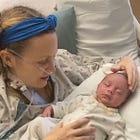Hi Substack family,
Happy Rare Disease Day.
The zebra is the symbol of rare disease because Nobel Prize winning Dr. Theodore Woodward once taught medical students, “When you hear hoofbeats, think horses, not zebras.”
He’s not wrong. He’s very smart. He cured Typhoid Fever. Most times, it will be a horse, but rare disease still represents a lot of people.
Zebras do exist. Rare diseases aren’t that rare. Around 25 to 30 million people in the U.S. are thought to live with a rare condition. That’s approximately one in ten people.
Today we celebrate the ZEBRAS!
Thank you for allowing me to share my journey with my rare disease Atypical Hemolytic Uremic Syndrome.
I spend so much of my life now trying to turn pain into purpose.
We will all be a patient. We will all be disabled at some point. This is part of the human experience. Sometimes it happens earlier than others. But our bodies do not last forever.
I implore you to vote for elected officials and policymakers who understand that patient advocacy is human advocacy.
That’s how I see it.
I’m not advocating for just some of us. I see it as advocating for all of us.
We deserve the best treatment possible. The medical system needs a bold new vision that includes insights from people who see a revolution happening in care - patients have a voice.
I want to empower patients and medical professionals to work as a team to overcome systemic challenges. When we work together, outcomes are better for everyone.
Let’s consider zebras.
Love, Tay
Reader Survey - Do you sit on the exam table or chair?
Curious - and don’t overthink it - but when you go to the doctor, do you sit in the chair or on the exam table? (I’m writing a piece about this for the blog. There’s not a wrong answer, but I’ve been thinking about it a lot!) Leave your answer in the comments. Thanks!
Taylor’s feature on the RARE DISEASE DAY Page!
Rebel Health by Susannah Fox
I want to give a shout out to a thought-leader in the patient-led movement revolution. She’s got a new book out and here is a great article where she talks about the patient arc from powerlessness to influence.
Her book REBEL HEALTH is incredibly thought-provoking and full of delicious statistics. I marked up all the margins.
Taylor’s Audio Piece- Goes Great With Making Breakfast
I’ve gotten very lovely feedback on the audio piece. Should I do more audio posts? Let me know your thoughts!
Full Audio here:
Are You On Instagram?
I’d love to connect there! Find me at https://www.instagram.com/taylorcoffmanmade/
If you’re new here and wondering, “what happened to this lady?” read:
I started writing this when I was on dialysis. It’s intended to be both memoir and a practical tool to help folks who might be going through something similar or those caregivers and family supporting someone with a challenging diagnosis. NOTE: This is not intended to replace actual medical guidance. Please consult your doctors on your individual challenges and situations. Please talk to your clinicians before adjusting any of your care protocols. Also names have been changed for most of my medical staff.
Thank you to new member CC Couchois - a true angel on this earth. We are so lucky to know you.
Thank you to Roy Lenn and Richard Burwick for your founding level donation.








The chair, the table is uncomfortable (usually no backing) . Plus sitting upright indicates I am present and focused to discuss my diagnosis and recovery
I sit in the chair unless directed otherwise. Sitting on the exam table makes me feel little and more scared, I think. :/